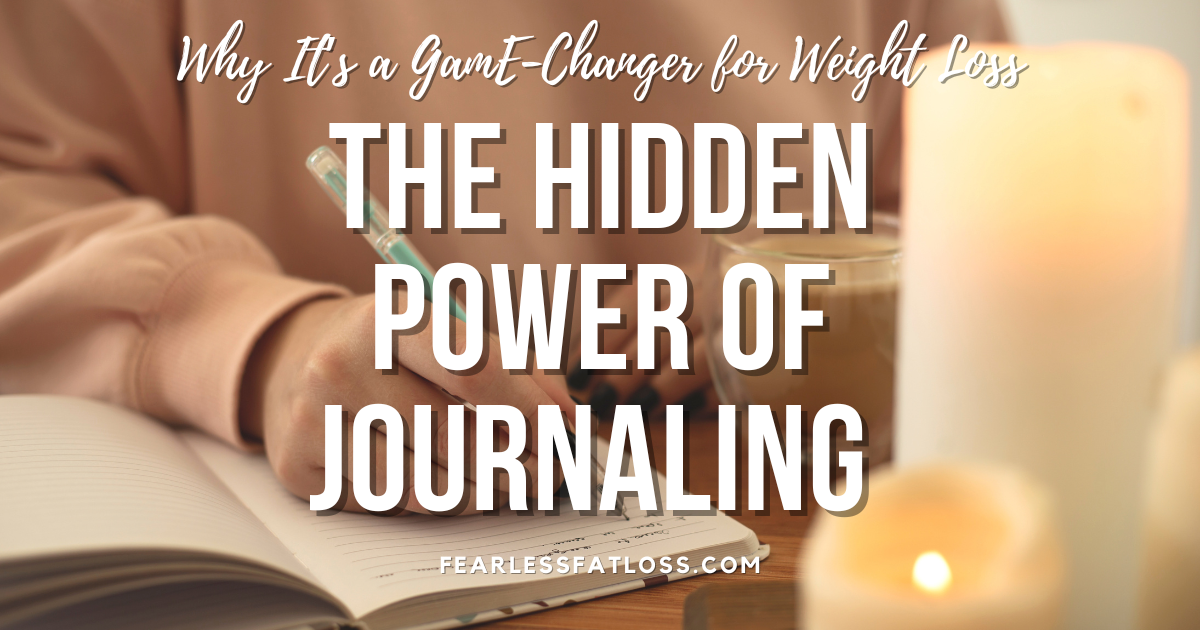The Hidden Power of Journaling: Why It’s a Game-Changer for Weight Loss
If you’ve tried diet after diet without lasting success, you’re not alone. Many women struggle with emotional eating, self-sabotage, and a cycle of losing and regaining weight. The problem isn’t just about food—it’s about mindset.
That’s where the power of journaling for weight loss comes in.
The Hidden Power of Journaling: Why It’s a Game-Changer for Weight Loss
Journaling isn’t just about tracking meals or writing down numbers. It’s a powerful tool that helps you break through mental roadblocks, build self-awareness, and create the inner shifts needed for sustainable weight loss. Let’s dive into why journaling is a game-changer for transforming your body and mind.
Why Traditional Dieting Fails Without Mindset Work
Most weight loss plans focus on external rules: eat this, don’t eat that, exercise more. But without addressing the underlying thoughts and emotions driving your eating habits, it’s easy to fall back into old patterns.
Research shows that lasting weight loss isn’t just about willpower—it’s about mindset. If your subconscious beliefs are working against you, no diet will ever stick.
That’s why journaling is so powerful—it helps you uncover the real reasons behind your eating habits, so you can shift them for good.
How Journaling Creates a Mindset Shift for Weight Loss
The power of journaling for weight loss lies in its ability to:
- Increase Self-Awareness – Many women don’t realize how emotions, stress, or certain triggers influence their eating. Writing things down helps you identify patterns and make intentional choices instead of reacting impulsively.
- Interrupt Negative Thought Cycles – If you constantly battle thoughts like “I’ll never lose weight” or “I always fail,” journaling helps you recognize and reframe these beliefs before they sabotage your progress.
- Reduce Emotional Eating – Studies show that expressive writing lowers stress and emotional reactivity, which can significantly reduce stress-based eating habits.
- Strengthen Commitment to Your Goals – Writing about your why and celebrating small wins keeps you motivated, even when the scale isn’t moving as fast as you’d like.
The Science Behind Journaling for Weight Loss
Journaling isn’t just a feel-good habit—it’s backed by science.
- Neuroscience research shows that writing engages the brain’s prefrontal cortex, the area responsible for decision-making and self-control. This means journaling can help you make more mindful choices about food and exercise.
- Studies on goal-setting reveal that people who write down their goals are significantly more likely to achieve them compared to those who don’t.
- Research on emotional regulation indicates that journaling helps process difficult emotions, reducing the likelihood of using food for comfort.
Why Journaling Works When Nothing Else Does
Unlike diets that focus only on what you eat, journaling helps you understand why you eat the way you do. It shifts your focus from external rules to internal transformation, making it easier to create lasting habits.
Instead of feeling like you’re constantly fighting against yourself, you start working with your mind and body.
Let the Frustration Go
If you’re frustrated with dieting and looking for a different approach, it’s time to harness the power of journaling for weight loss. This simple yet transformative practice can help you shift your mindset, break free from emotional eating, and finally create the lasting results you deserve.
Want to go deeper? I’ll be sharing an exciting opportunity soon to help you fully unlock the power of journaling for weight loss—so stay tuned! Join my email list to ensure you don’t miss out.





